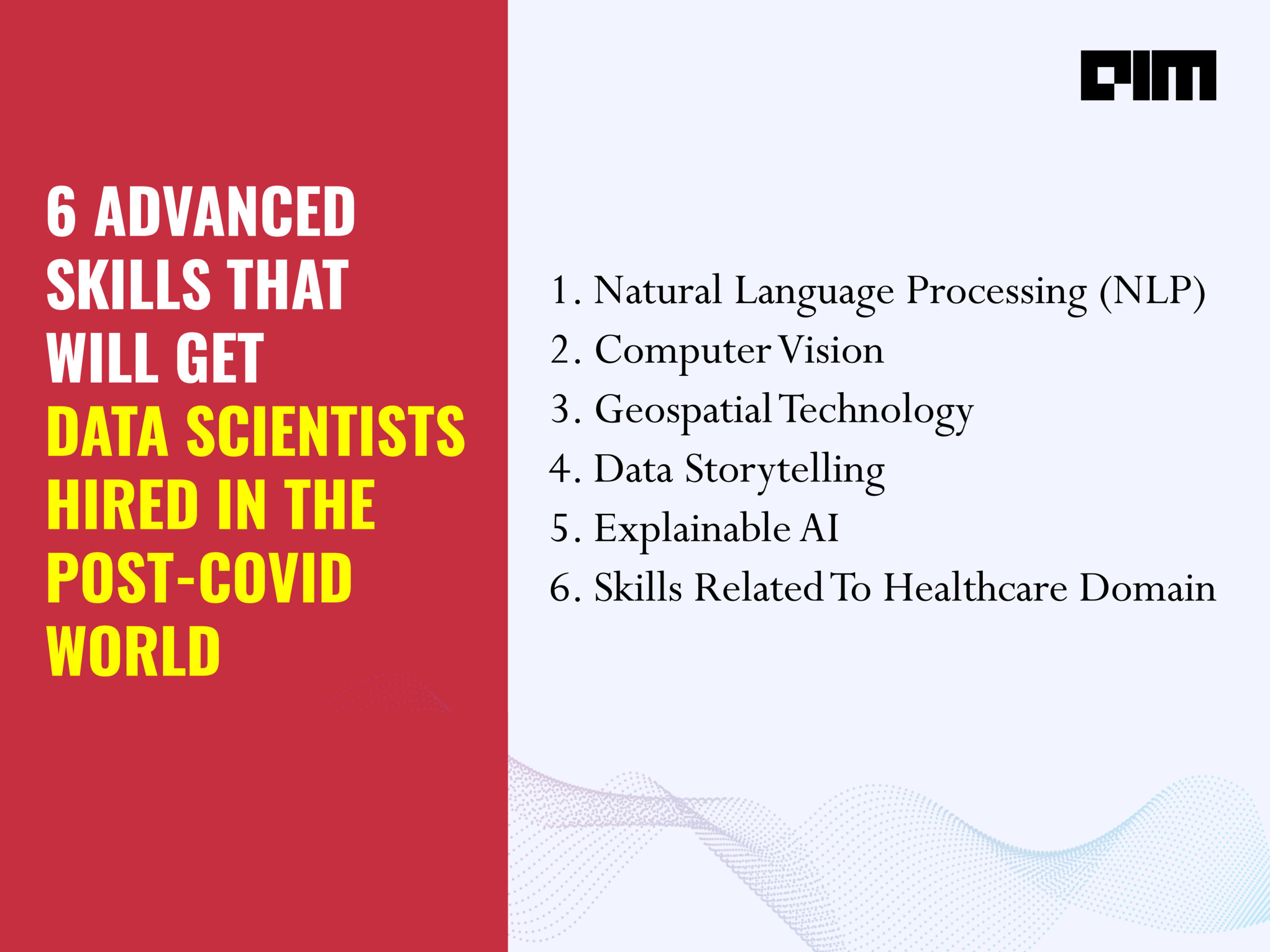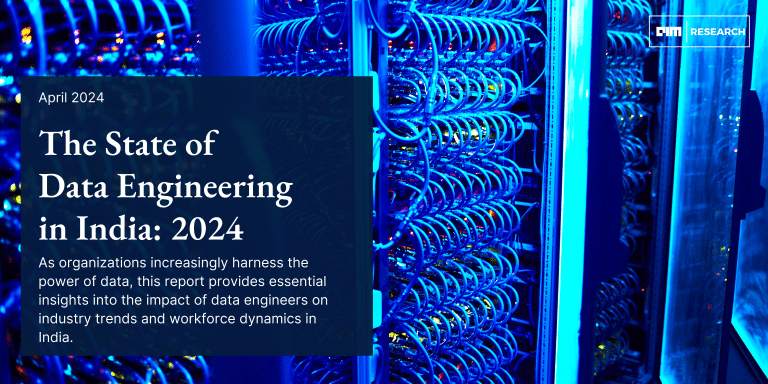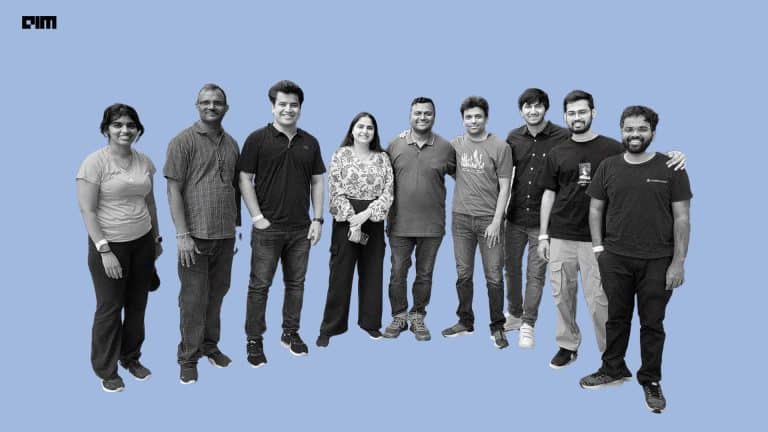The COVID-19 pandemic outbreak has urged companies to transform their strategies in order to have business continuity in the post-lockdown world. This, in turn, provided opportunities for data scientists to upskill/reskill themselves with relevant skill sets to keep up their relevancy. Therefore, it has become imperative for data science professionals to rethink their career strategies.
Alongside the automation boom, several data science skills sets are getting obsolete for business outcomes. Consequently, companies are currently looking to hire professionals with knowledge of advanced skill sets, which would be relevant for businesses in the post-COVID-19 world. In fact, a recent LinkedIn survey stated that amid the challenging times, data science professionals are cautiously optimistic about job opportunities. However, 63% of respondents who are active job seekers, 65% of full-time employees, and 61% of self-employed professionals, have stated that there will be an increased dependency on upskilling to survive this crisis.
Also, Zairus Master, CEO of Shine Learning, an online learning platform for professional courses, stated to the media that the company had seen a sharp rise in the number of enrollees opting to upskill themselves in courses like data science, blockchain, and machine learning. “… With remote working increasingly becoming the norm, we may see more demand for specific talent in this field,” said Master. To survive the post-COVID world, data science professionals need to learn some advanced skills that would make them hireable post this pandemic, here are a few skills that organisations would look for:
Natural Language Processing (NLP)
With businesses aiming to collect the maximum amount of data these days to have a better customer service amid this crisis, NLP could be an asset for companies. Many companies are also deploying self-service tools like bots that come with NLP integrated with multiple languages to address customer issues better. Data scientists must understand and master NLP to help businesses make automated solutions for a better outcome post-COVID world.
In fact, in recent news, Mercedes-Benz, a German global automobile maker, announced that the company has been developing deep learning (DL) and natural language processing (NLP) technologies to improve the driving experience. “By automating responses from gauging the needs and moods of the driver, the company’s smart technology has enabled a unique driving experience,” stated in the media.
Computer Vision
Another technology that would massively gain traction post-COVID world would be computer vision because of its ability to identify patterns in a huge volume of images. The usage of facial recognition technology can become the norm post the pandemic. In the current state, this technology of computer vision is heavily being used for maintaining social distancing and monitoring people to wear masks.
For this, the technology has been deployed in urban places for monitoring citizens by video surveillance, driving contactless screening, and tracking employee activities in organisations. In recent news — RayReach Technologies, a Chennai-based AI startup has been using this technology to create smart CCTVs for its customers to detect violations in social distancing. Therefore, gaining expertise in computer vision technology will make data scientists more hireable in the post-COVID world where social distancing could be the norm.
This technology also has great potential in the healthcare industry, wherewith the help of deep learning, doctors can detect anomalies in chest radiography images. With companies actively using this technology to enhance their workflows, it becomes critical for data scientists to learn this subset of artificial intelligence to sustain the market post-pandemic.
Also Read: 10 Popular Computer Vision Projects For Beginners
Geospatial Technology
During the COVID-19 pandemic, geospatial technology came in handy for companies and governments across the world that were using geographical data to map the disease outbreak and also tracking the infected areas of the country. With more people working on data-driven decision processes, geospatial data has been helping in better planning and processing of the system. The technology can also help manufacturing and retail industry to identify the density zones of the disease during this lockdown.
In fact, in recent news — geospatial experts, Transerve Technologies has announced their offering of Transerve Online Stack that works on geospatial data to map COVID-19 density zones. According to the company, this technology has been helping SMBs, large retailers and supply chain professionals in coming out strong and re-starting their business in the post-COVID world. And therefore, companies are looking to hire professionals who have expertise in working with geospatial data. A geospatial data scientist would be required to analyse vast geospatial datasets, which would include images from satellite, google maps, demographic data, socio-econometric data and topography to create insights that would help businesses gain profits.
Data Storytelling
Another aspect that would gain popularity among businesses would be the ability of compelling data storytelling by data science professionals. With data analytics becoming a prime concern for companies across industries, there has been an increased requirement for good data storytelling. Such an ability would make a data scientist more favourable among business leaders, as compelling storytelling would ease up the understanding of complex numbers and statistics for stakeholders and leaders. With good storytelling, data scientists can easily convey complex business information to their audience, which in turn would make them stand out from other professionals in the market.
This also enhances the chance of being more sustainable in the post-COVID world. According to experts, “We can recall facts up to 22 times more effective when they are part of a story as compared to when they are presented as isolated data points. Information presented in the form of a story also helps to reinforce our understanding and decipher patterns in complex data sets.” As data storytelling would help business leaders with powerful insights, it would, in turn, help them capitalise the market opportunities in the post-pandemic world. In fact, Pavan Kumar Thatha, who is an emerging technologies leader at Unisys, once stated in his interview that one could not become a data science professional without mastering the storytelling skill.
Explainable AI
With AI penetrating almost every aspect of human lives, it became imperative for businesses to be able to trust these machines and their decisions, and that’s where the need for explainable AI arises. Enterprises are currently looking to deploy AI models that can predict accurate insights along with providing explanations of those predictions. Therefore, data scientists who are well aware of explainable AI become a more favoured choice for businesses. For many years the prime concern had been the accuracy and the performance of AI models, however with the recent reluctance of accepting AI by many companies has brought in the requirement for transparency in the AI models’ predictions.
In fact, according to a survey, 82% of business leaders agreed that in order to trust artificial intelligence, it needs to be well explainable. To join in the effort, in recent news, Microsoft has announced a strong emphasis on developing tools for building more responsible and fairer AI systems. Also, software development company Pegasystems has announced their tools that would help companies in identifying and omitting the hidden biases of their AI models.
According to the VP of the company — “As AI is being embedded in almost every aspect of customer engagement, certain high-profile incidents have made businesses increasingly aware of the risk of unintentional bias and its painful effect on customers.” Consequently, in the post-COVID world, businesses would be looking to hire professionals who can govern the operations of their AI systems and can create explanations of the predictions.
Skills Related To Healthcare Domain
Post-COVID, the world would experience a massive demand in healthcare technologies, and therefore there would be a huge search for data science professionals who have expertise in the healthcare domain. Data science proved to be immensely beneficial for the treatment of COVID patients by leveraging patients’ data, however, without fundamental domain knowledge, these predictions could be inaccurate and can also have an adverse effect on developing drugs and medicines.
Even after the pandemic, healthcare would continue to be a prime concern for governments, businesses and individuals. Therefore, there would be a huge surge in demand for data professionals who can use real-time medical data to generate insights and help doctors make informed decisions.
In fact, as the pandemic outbreak has been going on, China’s tech giant, Baidu has released their Linearfold algorithm in order to help medical researchers to fight against the virus. Similar to this, many other companies have also developed tools to help doctors fight this crisis. Therefore, data scientists with advanced skill sets and knowledge in the healthcare domain would be more relevant to companies post-COVID world.



















































































